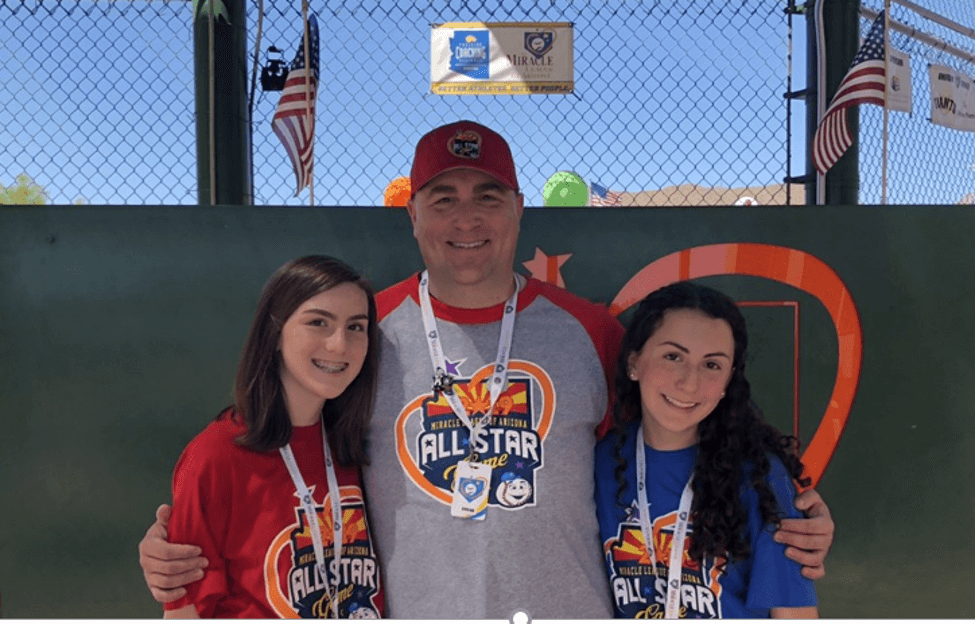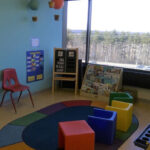One Dad’s Story: Giving Back Helped My Family Heal
FEATURED POSTS
February 16, 2026
Steve Olson’s day once started with an hour-long commute through the traffic-laden corridors of Silicon Valley, followed by long, intense hours at a high-stress job he did not even like.
Today, however, Steve lives an altogether different life. He’s a single father to his teenage daughters, Madeline and Addison; a volunteer with local nonprofits serving people with disabilities and special needs; and a community liaison for LEARN Behavioral, where he builds and fosters partnerships to help kids with autism.
In a recent interview in honor of Father’s Day, Steve shares how his family overcame heartache and sorrow caused by tragic losses—and their journey to a new start in Arizona.
Q: Let’s start with your story, Steve. Your family has experienced significant loss. Tell us about that.
A: We certainly have.
On March 2, 2012, I held the hand of my wife and best friend, Sandra, as she took her last breath. When Sandra lost her short, six-month battle to brain cancer, I knew at that moment that my world would forever change. I never thought I’d find true happiness again.
At the time, I was living in San Jose, California, with my two daughters, Madeline and Addison. We were still recovering from the tragic loss of my first wife, my daughters’ biological mother, Erika, who passed away in 2009 from a car accident.
Life was not turning out how I had envisioned. My daughters had lost both their biological mother and step-mom in the timespan of a few years.
Q: That is a lot for anyone, let alone two young girls. After your wife’s death, how were you able to cope?
A: Initially, I was blessed to have my parents help taking care of the girls. However, both my parents eventually passed away, too—my mom from breast cancer and my dad from a strange and tragic fall into a swimming pool. The timing of it all was terrible, not that the timing of any death is ever good. While this was happening, I did my best to hold things together at home and on the work front. I could somewhat distract myself at work, as I attempted to maintain a successful career in business development, but in all honesty, when I look back on that time period, I know I wasn’t the nicest person in the office or fully present at home for my daughters. I was in a severe grief-induced depression, simply going through the motions but not fully present for anyone.
Internally, I felt like I was failing on all fronts.
Q: What happened next?
A: Something needed to change. My girls and I needed a new start, so we decided, as a family, to relocate to Tempe, Arizona, in June 2018. That decision to leave behind our friends, and my high-paying, Silicon Valley job to take a self-imposed, year-long sabbatical—that decision was based entirely on putting our family first. The decision didn’t come easily, but looking back, it was the best thing that could have happened to us.
Q: What, in particular, made it the right choice?
A: In San Jose, the long hours and continuous stress were affecting all aspects of my life negatively. My girls knew I was still unhappy and welcomed the new start themselves. We didn’t know anyone in Arizona, but Tempe is home to the main campus of Arizona State University (ASU), a school both girls were open to attending. Plus, close to Tempe is Mesa, Arizona, the spring training home of my favorite baseball team, the Chicago Cubs. As an avid fan, I’d visited Mesa several times over the years, including with the girls, to attend baseball games. We loved the area.
A few months after arriving in our new home, we found the Miracle League of Arizona, a local nonprofit that provides baseball programming to individuals with special needs and disabilities. As a family, we started volunteering our time, helping individuals with physical and cognitive challenges get a chance to play baseball.
Q: Can you tell us more about the Miracle League of Arizona, and how it helped your family?
 A: The Miracle League of Arizona combined several of my life’s passions: time with my daughters, baseball, and helping others. I later accepted a fulltime position at that nonprofit, making a significant financial sacrifice but finding myself far better off in terms of my happiness.
A: The Miracle League of Arizona combined several of my life’s passions: time with my daughters, baseball, and helping others. I later accepted a fulltime position at that nonprofit, making a significant financial sacrifice but finding myself far better off in terms of my happiness.
Over time, we realized how much the act of giving back helped us heal from the tragedies we’d experienced. By giving up only a couple of hours of our time per week, we started to feel joy again as a family, while joining an amazing community in the process.
Another thing I discovered, as I worked with and learned more about individuals with special needs, is that I’m the one with the disability. I’m the one worrying about the future or stuck in the past. Individuals with developmental disabilities, including autism, tend to live more in the present. They tend to have a more positive mindset and be fundamentally happy, especially when someone shows them love.
Q: That’s a great insight, which, I imagine, influenced your choice to keep working with the special needs community. How else have you stayed involved?
A: I was asked to join the Board of Directors for two nonprofits, Mikey’s League and Pawsitive Friendships. Mikey’s League is an inclusive sports league, with sports like flag football and basketball designed for children with and without intellectual and developmental disabilities to, simply, play together. Pawsitive Friendships provides animal assisted therapy to children with special needs, allowing them to build animal-human friendships, while simultaneously working on individual therapy goals. Both of these organizations, in addition to the Miracle League, give me a chance to raise awareness of the same, underserved population—individuals with disabilities and special needs.
My daughters have also thrived in this environment. My oldest, Madeline, is a now a sophomore at ASU, studying elementary education. While Madeline has always loved children, her time at the Miracle League (she is also a staff member) reaffirmed her plan to teach one day. My younger daughter, Addison, was awarded “Most Valuable Volunteer” last year at the Miracle League for logging the most volunteer hours. She’ll be a high school senior in this fall and hopes to attend ASU in 2022, with interests in social work or, perhaps, becoming a therapist one day.
Q: How did you end up at LEARN Behavioral?
A: The pandemic affected my professional role with the Miracle League, as baseball services essentially shut down completely for more than a year. Lucky for me, when I was fully ready to resume my career—this time with the intent of doing something to help others—I discovered opportunities with LEARN’s new community liaison team. The timing turned out just right. And timing really is everything.
Q: What do you do as a community liaison associate?
A: The community liaison role is the human link between LEARN and the organizations and people we serve within our local communities.
I work with an amazing internal team focused on developing strong relationships with key influencers— physicians, other healthcare providers, school leaders—who can potentially serve as new referral sources to solidify LEARN’s nationwide presence within the industry. Together, we work closely with local clinical teams to coordinate our community outreach and networking efforts.
Before he passed away, my Pops used to say, “Love what you do, and never work another day in your life.” Today, I know what he meant.
Q: Your story is inspirational. Based on everything you’ve gone through, what advice might you offer others undergoing a challenge or in need of a change?
A: Go find your purpose. I know, in my heart, I’ve found mine. The reason I was put on this earth is not only to be “Daddy” to Madeline and Addison (yes, my teenage daughters still call me “Daddy,” and I hope that never changes) but also to serve others.
In our “Keeping up with the Joneses” society, the chase for the better job, bigger house, nicer car, perfect body… it leaves almost all of us feeling “less than.” But what are we really chasing anyway? Is it even obtainable, whatever “it” means?
It took a lot for me to get to this place in my life where I’m happy again, even without my best friend by my side. I never thought I’d reclaim my lost smile. My girls are active and happy, too, in our new community and always want to “give back” themselves—that couldn’t make me prouder.
As someone who spent what felt like years in the fetal position in tears, I realize now that it is, in fact, possible to find joy again. For me, it took giving of myself and helping others to step away from my own problems. By helping others, I didn’t have as much time to think about my problems, and that, in itself, was healing.
For anyone in pain, depression, sadness, or grief, volunteer your time, even when you think you have nothing to offer. Know that there are individuals worse off than you. Find them. Help them. And come to see through these selfless acts that you’re the one getting the greatest payback.







